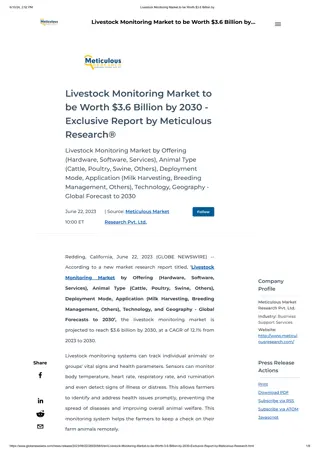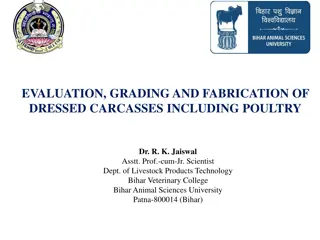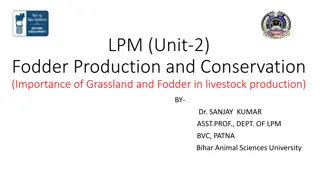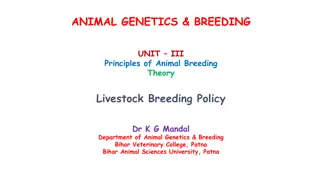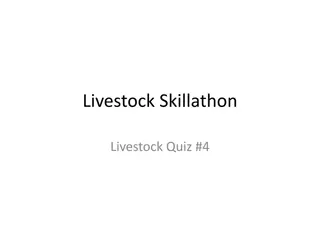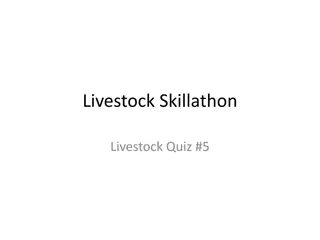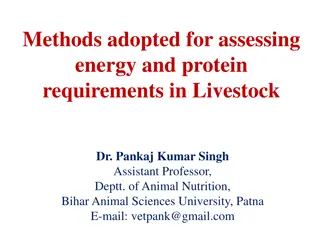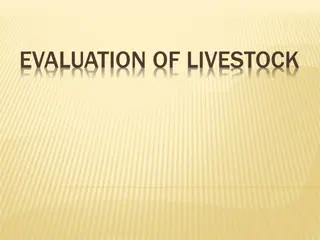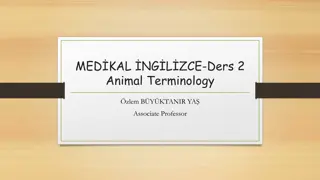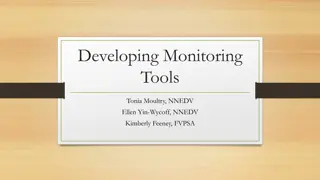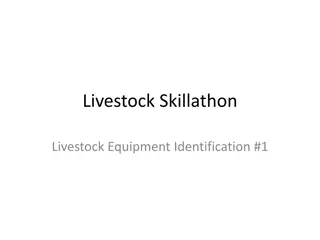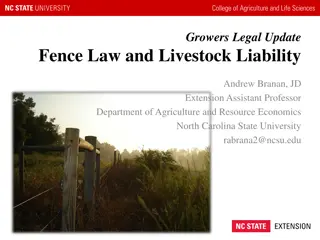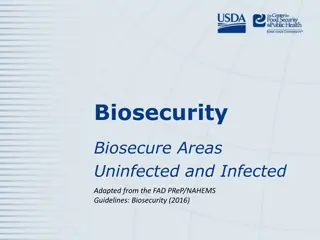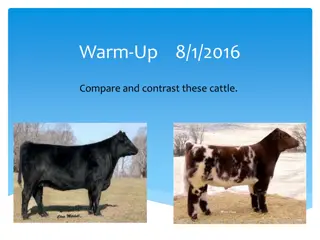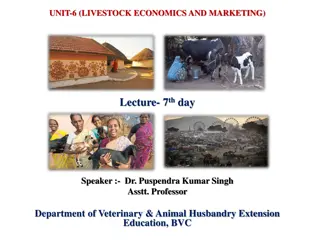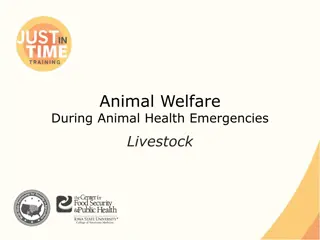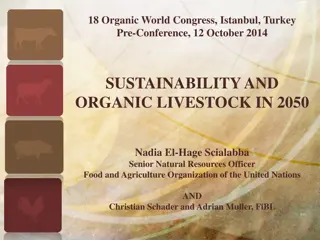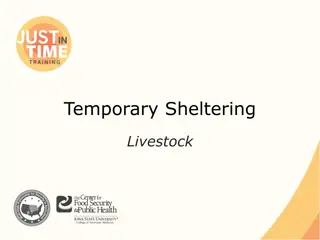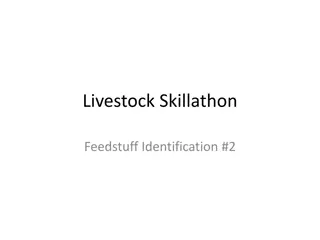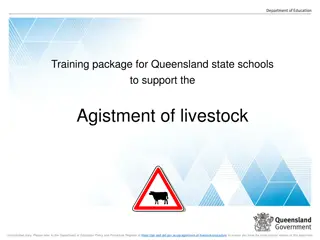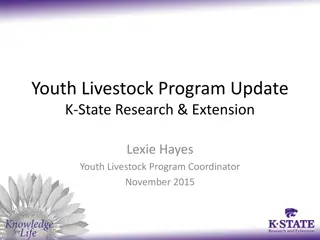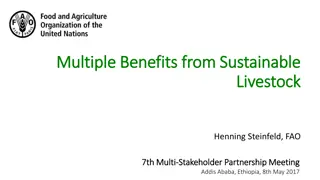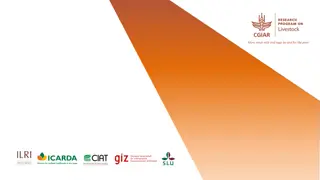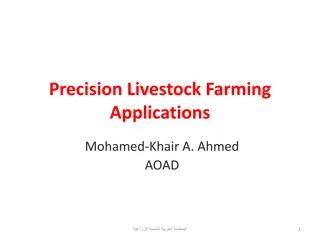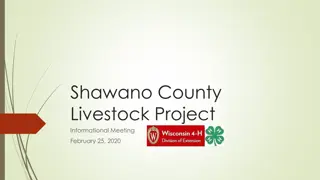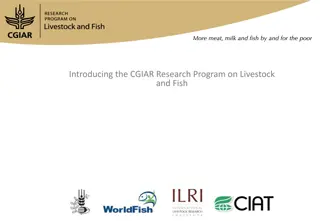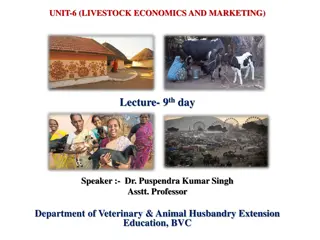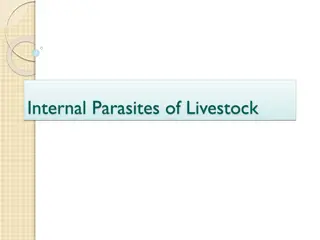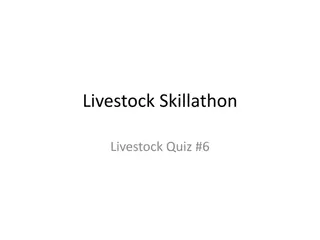Mobilizing Juncao Technology for Livestock Production in Nigeria
Nigeria, a country with vast land mass and a significant youth population, faces challenges such as desertification and ecological threats. Livestock agriculture plays a crucial role in the economy, providing food security, employment, and income. The adoption of Juncao technology, as presented at a
1 views • 29 slides
PATHWAYS Project: Transitioning Livestock Systems for Sustainability
PATHWAYS is a five-year project funded by the European Union with the goal of promoting sustainable practices in the European livestock sector. Through innovative methodologies and stakeholder engagement, the project aims to drive the transition towards more sustainable livestock production and cons
6 views • 10 slides
Livestock Monitoring Market to be Worth $3.6 Billion by 2030
Livestock monitoring systems can track individual animals' or groups' vital signs and health parameters. Sensors can monitor body temperature, heart rate, respiratory rate, and rumination and even detect signs of illness or distress.
0 views • 4 slides
Livestock Monitoring Market Trend to be Worth $3.6 Billion by 2030
The early detection of a disease in a population of animals\u2014a herd of cattle, for example\u2014is particularly useful in controlling certain chronic infectious diseases, such as mastitis, brucellosis, and tuberculosis, as well as certain non-infectious diseases, such as bloat. With sensor techn
0 views • 8 slides
Overview of Carcass Evaluation and Grading in Livestock Processing
Carcass evaluation and grading are vital processes in the marketing and merchandizing of livestock carcasses. Dr. R. K. Jaiswal, a knowledgeable Asstt. Prof.-cum-Jr. Scientist, delves into the significance of evaluation, dressing percent, carcass length, back fat thickness, ribbing, loin eye area, a
1 views • 24 slides
Livestock Marketing Functions and Classification
Livestock marketing involves various functions such as exchange, physical supply, facilitative functions like grading, transportation, storage, and more. These functions are classified into primary, secondary, and tertiary functions based on their roles. Assembling, processing, distribution, and equ
3 views • 23 slides
Importance of Green Fodder in Livestock Production by Dr. Sanjay Kumar
Fodder, essential for livestock like cattle, rabbits, and horses, includes hay, silage, and fresh forage plants. Green fodder provides easily digestible nutrients, essential for animal health and milk production. While concentrates may boost production, green fodder remains economical and vital due
1 views • 11 slides
Livestock Breeding Policy for Genetic Improvement of Cattle and Buffalo in India
India's diverse agro-ecological regions host a wide range of farm animal breeds. The livestock breeding policy aims to enhance the productivity of cattle and buffalo through strategies such as grading up with indigenous superior dairy breeds, crossbreeding with high-yielding exotic breeds, and selec
1 views • 23 slides
Livestock Skillathon Quiz Questions
Test your knowledge on livestock-related topics with this quiz featuring questions on mating systems, goat dehydration, mineral balance, muscle fat intermingling, body condition scoring, swine teeth, genetic structures, nutrient requirements, and livestock terminology.
1 views • 12 slides
Livestock Skillathon Quiz Challenge
Test your knowledge of livestock with this interactive quiz. Learn about cattle breeds, common diseases, breeding techniques, and terminology related to raising and caring for livestock. Challenge yourself and expand your understanding of the livestock industry.
0 views • 12 slides
Understanding Energy and Protein Requirements in Livestock
Assessing the energy and protein requirements in livestock is crucial to ensure optimal health and productivity. Dr. Pankaj Kumar Singh, Assistant Professor at Bihar Animal Sciences University, explains the significance of determining energy and protein needs for maintenance, metabolic processes, an
1 views • 21 slides
Livestock Evaluation and Cattle Market Priorities
In this visual guide, various aspects of livestock evaluation, focusing on cattle breeding, market priorities, muscle indicators, body parts of a cow, finish indicators, structural evaluation, rib and feeding ability assessment, and balance along with eye appeal considerations are discussed in detai
1 views • 65 slides
Animal Terminology in Livestock Farming
Animal terminology in livestock farming includes terms like breed, dam, flock, herd, livestock, polled, sire, litter, chickens, cattle, ducks, and goats. Understanding these terms is essential for those involved in animal husbandry and farming. This comprehensive guide provides definitions and expla
1 views • 18 slides
Livestock: Key Driver for Sustainable Agricultural Development
Livestock plays a crucial role in sustainable agricultural development by driving land use, consumption, and serving as a powerful engine for food systems. The focus on livestock is essential for exploring pathways towards Sustainable Agricultural Development (SAD) and addressing challenges related
1 views • 24 slides
Support for Earthquake-Affected Population in Rasuwa District, Aug 2015-Apr 2016
Support earthquake-affected population in Rasuwa District with shelter upgradation, material support, cash-for-work, livestock shed assistance, and earthquake-resistant techniques verification. Activities include distribution of shelter kits and tool kits, DRR training, mason training, construction
0 views • 13 slides
Developing Monitoring Tools for Programmatic Oversight
This presentation covers key aspects of monitoring tools for program oversight, including types of monitoring documents, notice of monitoring, and elements to consider. It discusses the importance of informing subawardees about monitoring visits and outlines the components of monitoring forms used i
0 views • 64 slides
Livestock Equipment Identification for Skillathon Participants
Explore a comprehensive guide on livestock equipment identification for skillathon participants. From all-in-one castrators to fencing pliers, this resource includes detailed descriptions and images of essential tools used in livestock management tasks such as artificial insemination, dehorning, and
0 views • 8 slides
Legal Update on Fence Law, Livestock Liability, and Zoning Regulations
Understanding the legal aspects of fence laws, livestock liability, and zoning regulations is crucial for growers and farmers. This update covers key points such as personal liability limits, compliance with exemptions, and the implications of livestock escaping. It also delves into boundary fencing
0 views • 28 slides
Understanding Biosecure Areas in Livestock Management
This presentation showcases examples of biosecure areas in livestock management, emphasizing the importance of separating uninfected and infected premises to prevent the transfer of diseases. The guidelines outlined by FAD PReP/NAHEMS stress the need for a clear line of separation and strategic prot
0 views • 17 slides
Livestock Classes and Breeds: A Comparative Overview
Livestock consists of major classes such as Dairy, Beef, Sheep, Swine, and Goats, each serving specific purposes like milk, meat, wool, and more. Understanding the types of livestock within these classes, feeding requirements, and the distinction between purebred and crossbred animals is essential f
0 views • 9 slides
Livestock Economics and Marketing: Understanding Markets and Classification
Livestock markets are essential for the buying and selling of livestock and related products. Markets can be classified based on various factors such as location, nature of commodities, time span, and more. Understanding the essentials of markets, livestock market components, and classification help
0 views • 18 slides
Comprehensive Guide to Livestock Animal Welfare During Health Emergencies
Ensuring the welfare of livestock animals during health emergencies is crucial. This comprehensive guide covers various aspects such as ethical responsibilities, the Five Freedoms framework, daily requirements for water and feed, ensuring freedom from discomfort and pain, allowing animals to express
0 views • 11 slides
Livestock Data Management and Recording Guidelines
This documentation outlines the correct procedures for submitting livestock data, including details on birth notifications, calving information, AI processes, calf identification, and more. Topics covered include birth dates, twin identification, AI horn codes, dam and sire identification, calving e
0 views • 11 slides
Sustainability and Organic Livestock Modeling for Global Food Security
The research presented at the 18th Organic World Congress in Istanbul delves into the Sustainability and Organic Livestock (SOL-m) modeling approach developed by FAO and FiBL. The study aims to explore the potential impacts of global conversion to organic livestock production by 2050 on food securit
0 views • 25 slides
Understanding Blister Beetles and Livestock Toxicity: Impacts and Management
Blister beetles are a biological control agent of grasshoppers but can become a problem, especially during drought years. This presentation discusses how blister beetles develop, their impact on plants and livestock, and the toxicity of cantharidin found in these beetles. Livestock, especially horse
0 views • 9 slides
Livestock Temporary Sheltering and Emergency Preparedness
This comprehensive guide covers essential aspects of temporary sheltering for livestock during emergencies such as natural disasters, displacement, and evacuation. It includes assessments, planning, facility setup, shelter requirements, possible shelter sites, supplies needed, and transportation con
0 views • 20 slides
Livestock Skillathon Feedstuff Identification Challenge
Test your knowledge of livestock feedstuff identification with this skillathon. Identify various feedstuffs including whole soybean, crimped oats, oyster shells, fish meal, ground ear corn, and liquid molasses. Explore images of different feedstuffs and sharpen your understanding of their characteri
0 views • 8 slides
Agistment of Livestock Training Package for Queensland State Schools
This training package provides guidance for Queensland state schools on agisting livestock, covering topics such as governance, livestock management, legislation, and ethics. It emphasizes the responsibility of schools in managing livestock, including educational and commercial arrangements, with a
0 views • 20 slides
Youth Livestock Program Update & Overview
Youth Livestock Program Update features activities like Junior Producer Days, Discovery Days, and the Nomination Process conducted by K-State Research & Extension. The program aims to educate participants on selection, nutrition, care, and showmanship of livestock. Events include educational program
0 views • 14 slides
Livestock Breed Identification Skillathon Images
This collection of images showcases various livestock breeds including Swine, Beef Cattle, and Sheep, providing visual references for breed identification in skillathons. Each image features different breeds categorized by species, offering valuable insights for livestock enthusiasts and agriculture
0 views • 14 slides
Virginia Livestock Programs and Opportunities for Youth
Explore a variety of exciting opportunities in the Virginia 4-H Livestock Programs, including state-sponsored events, contests, and educational exhibitions for youth interested in livestock agriculture. From livestock judging to cattle working contests, these programs provide valuable experiences fo
0 views • 34 slides
Intelligent Livestock Health Management System in Rural Bangladesh
Livestock farming is vital for rural families in Bangladesh, but faces challenges like scarcity of veterinarians and affordable services. To address this, the Intelligent Livestock Health Management System was developed using a smart phone application called Livestock Monitoring System (LMS). LMS pr
0 views • 12 slides
Sustainable Livestock and Future Generations
Sustainable development aims to meet present needs without compromising the ability of future generations to meet their own. Cooperation and responsible resource management, particularly in livestock farming, play crucial roles in ensuring a balanced ecosystem and socio-economic prosperity. The conc
0 views • 32 slides
Enhancing Livestock Productivity for Global Food Security
The CGIAR Research Program on Livestock is dedicated to improving the productivity and affordability of meat, milk, and eggs in developing countries. Through sustainable practices and support from donors, the program aims to make these essential food items more accessible to those in need. Images sh
0 views • 13 slides
Advancing Livestock Farming Through Precision Technology
Precision Livestock Farming (PLF) utilizes automated real-time monitoring to enhance production, reproduction, health, and welfare of animals. By measuring animal and environmental variables, utilizing predictive models, and integrating data for decision-making, PLF offers benefits such as improved
0 views • 28 slides
Shawano County Livestock Project Informational Meeting Overview
The Shawano County Livestock Project Informational Meeting held on February 25, 2020, provided crucial details and updates for participants. Topics covered included introductions of key committee members, rules and policies for exhibitors, important dates to remember, initial weigh-ins for different
0 views • 18 slides
Accelerating Livestock and Aquaculture Development for Poverty Reduction
The CGIAR Research Program on Livestock and Fish aims to address the challenges and misconceptions surrounding livestock and aquaculture development. It focuses on increasing productivity in small-scale systems to benefit the poor and improve food security. The program seeks to correct misconception
0 views • 27 slides
Livestock Economics and Marketing: Market Information and Institutional Approach
Market information plays a crucial role in livestock economics and marketing by providing essential knowledge on prices, quantities, and stocks, aiding decision-making for farmers and market intermediaries. It encompasses market news and market intelligence. The collection of market information is d
0 views • 11 slides
Understanding Internal Parasites of Livestock
Internal parasites of livestock, such as roundworms, tapeworms, and flukes, can have a significant impact on the health and productivity of animals. These parasites live within the internal organs of livestock, causing various symptoms and affecting different species. Roundworms, like stomach worms,
0 views • 30 slides
Livestock Skillathon Quiz on Animal Husbandry
Explore your knowledge on livestock management with this quiz covering topics like animal hormones, castration methods, ideal weights for market steers, drug withdrawal times, and more. Test your understanding of livestock terminology and practices in this engaging quiz.
0 views • 12 slides



